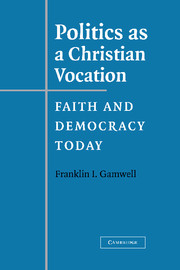Book contents
- Frontmatter
- Contents
- Preface
- Politics as a Christian Vocation
- Introduction: The Present Purpose
- 1 Render to Caesar
- 2 Government by the People
- 3 Faith and the Way of Reason
- 4 Justice in the Community of Love
- 5 Religious Decisions at Stake
- 6 Political Deliberations
- Appendix: On the Humanistic Commitment
- Works Cited
- Index
4 - Justice in the Community of Love
Published online by Cambridge University Press: 18 February 2010
- Frontmatter
- Contents
- Preface
- Politics as a Christian Vocation
- Introduction: The Present Purpose
- 1 Render to Caesar
- 2 Government by the People
- 3 Faith and the Way of Reason
- 4 Justice in the Community of Love
- 5 Religious Decisions at Stake
- 6 Political Deliberations
- Appendix: On the Humanistic Commitment
- Works Cited
- Index
Summary
A brief summary of the previous two chapters will be useful in setting the stage for this one. Seeking clarity about politics as a Christian vocation, we asked about the nature of democracy as a form of political community. Having answered that government by the people makes sense only as a full and free political discourse, we were led to ask whether Christian faith includes the humanistic commitment. I have commended a positive answer. The God in whom Christians believe is necessarily present to all humans, calling them to love God without reservation. Hence, Christian belief can be assessed through reasons authorized by common human experience, and Christian faith prescribes the humanistic commitment. Once this commitment is accepted, moreover, there is no principled way to stop the drive to popular sovereignty. Any attempt to arrest it is bound to assert grounds for political inequality, and reason does not privilege persons but solely claims that can be redeemed by argument. The modern affirmation of reason and the emergence of democracy are not only historically connected but also wedded by logic. If it prescribes the humanistic commitment, Christian faith insofar mandates government by the people.
To be sure, democracy cannot be prescribed unless it is a real possibility, and some argue that popular sovereignty waits on certain economic and social prerequisites. For instance, a community most of whose members suffer severe poverty and illiteracy cannot in fact be ruled by the many.
- Type
- Chapter
- Information
- Politics as a Christian VocationFaith and Democracy Today, pp. 79 - 105Publisher: Cambridge University PressPrint publication year: 2004



